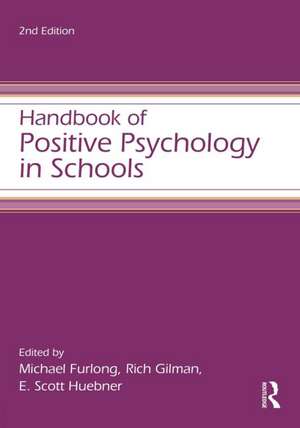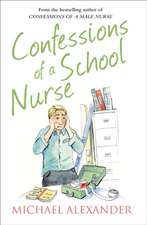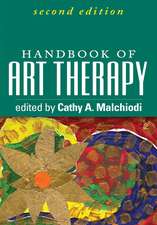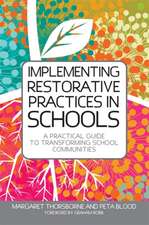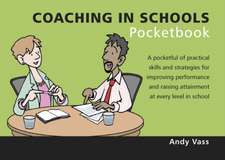Handbook of Positive Psychology in Schools: Educational Psychology Handbook
Editat de Michael J. Furlong, Rich Gilman, E. Scott Huebneren Limba Engleză Paperback – 21 feb 2014
| Toate formatele și edițiile | Preț | Express |
|---|---|---|
| Paperback (1) | 856.66 lei 6-8 săpt. | |
| Taylor & Francis – 21 feb 2014 | 856.66 lei 6-8 săpt. | |
| Hardback (1) | 1945.78 lei 6-8 săpt. | |
| Taylor & Francis – 3 mar 2014 | 1945.78 lei 6-8 săpt. |
Din seria Educational Psychology Handbook
- 9%
 Preț: 804.33 lei
Preț: 804.33 lei - 9%
 Preț: 768.08 lei
Preț: 768.08 lei - 9%
 Preț: 804.77 lei
Preț: 804.77 lei - 5%
 Preț: 731.20 lei
Preț: 731.20 lei - 25%
 Preț: 666.31 lei
Preț: 666.31 lei - 18%
 Preț: 806.90 lei
Preț: 806.90 lei - 9%
 Preț: 1798.95 lei
Preț: 1798.95 lei - 25%
 Preț: 689.67 lei
Preț: 689.67 lei - 18%
 Preț: 859.58 lei
Preț: 859.58 lei - 18%
 Preț: 851.93 lei
Preț: 851.93 lei - 18%
 Preț: 849.52 lei
Preț: 849.52 lei - 18%
 Preț: 965.19 lei
Preț: 965.19 lei - 18%
 Preț: 857.42 lei
Preț: 857.42 lei - 18%
 Preț: 794.30 lei
Preț: 794.30 lei - 25%
 Preț: 607.05 lei
Preț: 607.05 lei - 18%
 Preț: 739.82 lei
Preț: 739.82 lei - 18%
 Preț: 811.49 lei
Preț: 811.49 lei - 18%
 Preț: 749.45 lei
Preț: 749.45 lei - 18%
 Preț: 791.60 lei
Preț: 791.60 lei - 18%
 Preț: 962.37 lei
Preț: 962.37 lei - 18%
 Preț: 745.04 lei
Preț: 745.04 lei
Preț: 856.66 lei
Preț vechi: 1044.71 lei
-18% Nou
Puncte Express: 1285
Preț estimativ în valută:
163.91€ • 171.16$ • 135.36£
163.91€ • 171.16$ • 135.36£
Carte tipărită la comandă
Livrare economică 15-29 aprilie
Preluare comenzi: 021 569.72.76
Specificații
ISBN-13: 9780415621861
ISBN-10: 0415621860
Pagini: 530
Ilustrații: 17 black & white tables
Dimensiuni: 174 x 246 x 33 mm
Greutate: 1.02 kg
Ediția:Revised
Editura: Taylor & Francis
Colecția Routledge
Seria Educational Psychology Handbook
Locul publicării:Oxford, United Kingdom
ISBN-10: 0415621860
Pagini: 530
Ilustrații: 17 black & white tables
Dimensiuni: 174 x 246 x 33 mm
Greutate: 1.02 kg
Ediția:Revised
Editura: Taylor & Francis
Colecția Routledge
Seria Educational Psychology Handbook
Locul publicării:Oxford, United Kingdom
Notă biografică
Michael J. Furlong is a professor in the Department of Counseling, Clinical, and School Psychology at the University of California, Santa Barbara
Rich Gilman is in the Division of Child and Adolescent Psychiatry at Cincinnati Children’s Hospital Medical Center, and Professor in the Department of Pediatrics at the University of Cincinnati Medical School, US
Scott Huebner is Professor in the School Psychology Program in the Department of Psychology at the University of South Carolina
Rich Gilman is in the Division of Child and Adolescent Psychiatry at Cincinnati Children’s Hospital Medical Center, and Professor in the Department of Pediatrics at the University of Cincinnati Medical School, US
Scott Huebner is Professor in the School Psychology Program in the Department of Psychology at the University of South Carolina
Cuprins
Section I. CONCEPTUAL FOUNDATIONS, Chapter 1. Toward a Science and Practice of Positive Psychology in Schools: A Conceptual Framework, Chapter 2. Covitality: A Synergistic Conception of Adolescents’ Mental Health, Section II. INDIVIDUAL POSITIVE PSYCHOLOGY ASSETS, Chapter 3. Measuring and Promoting Hope in Schoolchildren, Chapter 4. Optimism: What It Is and Its Relevance in the School Context, Chapter 5. Gratitude in School: Benefi ts to Students and Schools, Chapter 6. Empathy, Prosocial Behavior, and Positive Development in Schools, Chapter 7. Emotion Regulation: Implications for Positive Youth Development, Chapter 8. Academic Self-Efficacy, Chapter 9. Promoting Positive Motivational Goals for Students, Chapter 10. Achievement Emotions, Chapter 11. Creativity in the Schools: Renewed Interest and Promising New Directions, Chapter 12. Student Engagement, Chapter 13. Life Satisfaction and Schooling, Section III CONTEXTUAL EDUCATIONAL FACTORS AND RESOURCES, Chapter 14. Flow in Schools Revisited: Cultivating Engaged Learners and Optimal Learning Environments, Chapter 15. Meaningful Activity Participation and Positive Youth Development, Chapter 16. Cultivating Mindfulness in Students, Chapter 17. Peer Relationships and Positive Adjustment at School, Chapter 18. ClassMaps Consultation: Integrating Evaluation Into Classrooms to Promote Positive Environments, Chapter 19. Building Resilience in Schools Through Social and Emotional Learning, Chapter 20. School Climate: Defi nition, Measurement, and Application, Chapter 21. Engaging Students in School Climate Improvement: A Student Voice Strategy, Chapter 22. Positive Psychology and School Discipline, Chapter 23. Understanding and Promoting School Satisfaction in Children and Adolescents, Chapter 24. Innovative Models of Dissemination for School-Based Interventions That Promote Youth Resilience and Well-Being, Section IV. SCHOOL-BASED INTERNATIONAL PERSPECTIVES, Chapter 25. Positive Education: An Australian Perspective, Chapter 26. Enhancing Well-Being in Youth: Positive Psychology Interventions for Education in Britain, Chapter 27. Applications of Positive Psychology to Schools in China, Chapter 28. Emotional Intelligence: School-Based Research and Practice in Italy, Chapter 29. Hope in Students: Theory, Measures, and Applications to Portuguese Schools, Chapter 30. Positive Psychological Interventions in U.S. Schools: A Public Health Approach to Internalizing and Externalizing Problems, Section V. PERSPECTIVE, Chapter 31. Positive Psychology in Schools: Good Ideas Are Never Enough, Index
Descriere
The field of positive psychology investigates factors that facilitate a student’s sense of agency and active school engagement. This groundbreaking handbook describes the application of positive psychology to educational policy, and explores how its constructs relate to the school experiences of children and youth. The second edition features thirteen new chapters and a section devoted to international applications of positive psychology. Other topics explored include conceptual foundations, assessment, intervention issues, and service delivery models.
